Bernanke faults US on the AIIB, sees yuan shoring up
Updated: 2015-06-03 11:17
By Agencies(China Daily USA)
|
||||||||
Former US Federal Reserve chairman Ben Bernanke on Tuesday criticized US lawmakers for allowing China to outmaneuver it with a new Asian bank that threatens Washington's oversight of the world economic order.
Speaking in Hong Kong, Bernanke also echoed the International Monetary Fund (IMF) in saying China's currency was "much better aligned" today, after Western criticism that Beijing cheats in global trade by distorting the yuan's exchange rate.
With the launch of the Asian Infrastructure Investment Bank (AIIB) and its plans to gradually roll out the yuan as an international currency, China is flexing its economic muscle, to the consternation of some US critics.
Bernanke said that the US Congress had only itself to blame after refusing to ratify reforms agreed to in 2010 that would have given greater clout to China and other emerging powers in the IMF.
It remains "better to have a global unified system" playing to standardized rules, he told an audience of investors on the sidelines of the World Business Forum in Hong Kong.
"But I understand entirely that if the Congress will not allow the (IMF's) governance system to appropriately reflect the changing economic weights, then I understand why other countries would say, 'Let's take our marbles and go home'," Bernanke said.
"It's not a good development" to have competing institutions, "but I can understand why China and other countries might want to say 'Well, we're going to set up our own system.'"
Bernanke noted that private capital was today vastly bigger than in 1944, when the IMF and World Bank were set up, presenting another outlet for infrastructure borrowing beyond government-backed lenders.
China has won support from Asia and Europe for the new AIIB, which aims to support infrastructure projects across the Asia-Pacific region. But the United States and Japan have shunned the initiative.
The new bank is expected to amplify China's ongoing program to boost the yuan's international profile, although the government is wary of moving too quickly before the financial system is ready to cope with the stresses of greater openness.
Bernanke said Beijing was right to stick to "incremental steps" that could one day turn the yuan into a major reserve currency alongside the dollar and euro.
The yuan's value, he added, had "appreciated considerably" over the past five years and was closer to fair value. That view is in line with a new IMF appraisal but at odds with the US Treasury, which still insists the currency is too cheap.
US Treasury Secretary Jacob J. Lew said last week that the yuan remains undervalued and the exchange rate is a source of concern. The IMF, which will consider including the currency in its Special Drawing Rights in an October review, on May 26 dropped a long-held view that the yuan was too cheap and urged China to achieve an effectively floating exchange rate within two to three years.
"The Chinese currency is much better aligned," Bernanke said. It "is certainly moving in the direction of being fairly valued", although he said the yuan had a ways to go before it could be an international reserve currency.
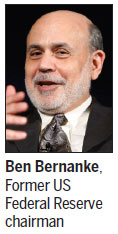
He said that "involves more than just being a strong economy. To move in that direction, China will have to continue to liberalize its capital account, current trading regimes, and strengthen and deepen its bond markets and other asset markets."
The yuan has strengthened against 30 of 31 major currencies in the decade since China scrapped a dollar peg, trailing only the Swiss franc. Its 34 percent jump versus the greenback in that time compares with slides of 26 percent or more for the currencies of Brazil, Russia and India.
"The US is becoming increasingly a lone voice as it argues the yuan is undervalued," said Nathan Chow, an economist at DBS Bank Hong Kong Ltd. "More and more independent organizations are arguing that the yuan is at equilibrium, and its price is fair."
The yuan trades at about 6.20 a dollar, having held its value this year as the prospect of a US interest rate increase boosted the greenback against all but five of the major currencies. The People's Bank of China will keep the exchange rate "basically stable at equilibrium" it said in April.
The yuan's resilience as the US prepares to raise interest rates makes holding the Chinese currency more attractive, helping increase worldwide usage before the IMF reviews the Special Drawing Rights basket of reserve currencies.
(China Daily USA 06/03/2015 page1)

 Rescuers fought bad weather at night
Rescuers fought bad weather at night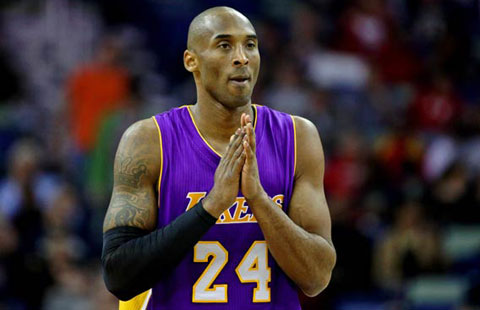
 Kobe Bryant causes a stir on Weibo
Kobe Bryant causes a stir on Weibo
 Ten photos you don't wanna miss - June 3
Ten photos you don't wanna miss - June 3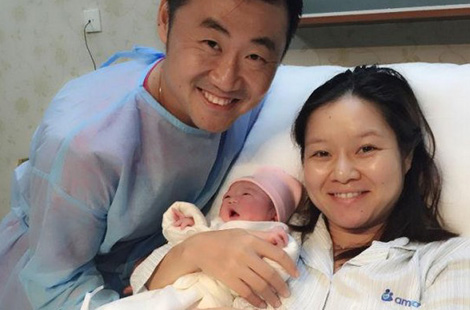
 Li Na gives birth to baby girl
Li Na gives birth to baby girl
 Culture Insider: Mysterious imperial toys of the Qing Dynasty
Culture Insider: Mysterious imperial toys of the Qing Dynasty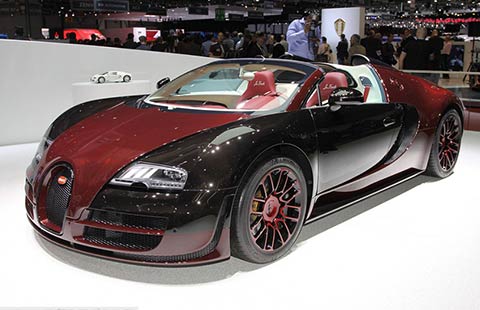
 Top 10 most expensive sports cars for 2016
Top 10 most expensive sports cars for 2016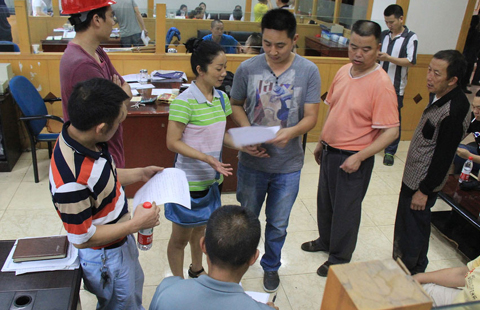
 Anxious wait for family members of passengers on capsized ship
Anxious wait for family members of passengers on capsized ship
 Key facts in the 12 hours after ship capsizes in Yangtze River
Key facts in the 12 hours after ship capsizes in Yangtze River
Most Viewed
Editor's Picks

|

|

|

|

|

|
Today's Top News
Ship disaster in Yangtze River: Roundup of updates
Obama signs bill remaking NSA phone records program
Unconfirmed multiple bomb threats made against flights in US
Where Caitlyn Jenner found her Vanity Fair style inspiration
Ship carrying 458 people sinks in Yangtze River
Win-win solution is US should seek in Aisa
Woman behind Silicon Valley sex bias suit appealing verdict
Defense hawk Senator Lindsey Graham launches presidential bid
US Weekly

|

|